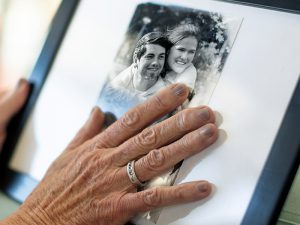How to Cope with the Loss of an Adult Child
After one of life’s greatest losses, it’s okay not to be okay. Here’s what you might expect—and some ideas to help you feel like yourself again.
 This wasn’t the way things were supposed to turn out: You raised your son or daughter through the bumps, bruises, and joys of childhood. You got up for middle-of-the-night feedings for your baby and stayed up late, waiting for your teenager to get home.
This wasn’t the way things were supposed to turn out: You raised your son or daughter through the bumps, bruises, and joys of childhood. You got up for middle-of-the-night feedings for your baby and stayed up late, waiting for your teenager to get home.
And now, with your child all grown up, with an independent life filled with hope and promise, you’ve had to say goodbye forever. Their death is an out-of-order event that overwhelms parents with grief and turns life upside down.
Losing a beloved child who may have become, over the years, a cherished friend and companion is every parent’s worst nightmare and tops the list of traumatic life events. And if you’ve suffered this terrible loss, it’s no wonder you’re left reeling, even questioning the meaning of your own life.
To make matters worse, the death of your grown child can leave your friends uncertain about how to respond. “People often just don’t know what to say when it comes to adult children,” observes Shelby Linstrom, L.P.C., a clinical psychologist specializing in grief counseling in Annville, Pennsylvania.
“They may be quick to offer opinions and judgments, and tell you, ‘Oh, it’s not as bad as if they’d died when they were three or ten,’” Linstrom continues. “But your loss is your loss, whether your child was an infant or an adult. It’s hurtful to have your pain dismissed and swept under the rug.”
And if the emotional quagmire weren’t enough, there may also be practical matters to deal with. If you were depending on your adult son or daughter for financial or housing support, the loss may be especially devastating. Other complications may include overseeing the estate of an unmarried child, or navigating the tumultuous waters with your daughter- or son-in-law, or stepping in to help comfort grandchildren.
How Grief Impacts Your Health
In the midst of devastating grief, it’s no wonder you feel isolated and confused. But you may not be as alone as you think you are. As our society ages, and as lifespans increase, more older people are experiencing the loss of an adult child. Researchers at the University of Texas at Austin note that 7 percent of those who are 90 or older have lost a child since they reached the age of 50.
Though it may be a more common occurrence than it used to be, it still knocks you sideways. The death of a child is linked to a higher risk of having a heart attack. It can also lead to a mental health issue, like depression, anxiety, and post-traumatic stress disorder, especially among people older than 70.
The loss of a child can even put you at greater risk of dying. Remember when film star Debbie Reynolds (most often remembered for Singin’ in the Rain) passed away just one day after her daughter Carrie Fisher (a.k.a. Princess Leia) in 2016? Turns out, there may be a biological reason for that. Recent studies have shown that severe symptoms of grief can raise levels of inflammation that lead to a variety of health problems.
And folks aged 50 to 70 who have suffered the loss of a child are twice as likely to die within two years compared with people with similar ages and health, according to findings from the National Institute of Aging.
That’s not surprising, says Linstrom. “There’s a powerful mind-body connection,” she explains. “What we feel in the mind, we experience in the body. It’s not what we think of as normal to lose a child—as parents we think, ‘I’ll be gone one day but my children will live on.’ But when that happens, we try to make sense of the universe—and when we can’t find the logic, our pain increases, and our body responds.”
Coping Strategies for Overcoming Loss
You will always miss your child and grieve his or her passing. Your life will never be the same again. But there are ways to grieve that can help you cope, find meaning, and bring you a measure of peace and well-being. Here are some steps to think about.
Give Yourself Time
It may seem impossible, but eventually, you’ll get your bearings and be able to get back to your regular activities. But for each person, “eventually” means something different. So be patient with yourself.
“Society used to give people the space for their grief,” says Linstrom. “Now, though, people may tell you, ‘Oh, it’s been three months, you should be OK.’ You’re allowed to feel bad, and you’re allowed to have days when you feel angry. Grieving has its own timetable, so let it flow as it’s supposed to.”
Cherish the Memories
Chances are, you have scrapbooks of pictures and memorabilia of your child’s life. Don’t stuff it all in a box and stick it in a closet. Choose a few photos to keep close that remind you of your child’s joys and accomplishments.
Some grieving parents, especially those whose child has died by suicide, find it healing to set up a memorial page on social media to share anecdotes with their child’s friends.
Whatever format you use, try to focus on the happy times in your child’s life. “Your child deserves to be remembered, so come up with a way to remember them well and in a way that’s meaningful for you.”
Create Rituals
Even after you begin to feel better, moments of grief may still catch you by surprise. So be prepared, Lindstrom advises.
“When you miss your child and feel that intense sense of grief, what can you do to deal with it in a healthy way every time?” she asks. “Have something that you’ve practiced that allows you to cope with that wave of sadness when it comes.”
Some people she’s helped have set a place at the table for the missing loved one, perhaps with a picture or a candle. Others may kiss a photograph. “It can symbolize the connection that’s still in your heart by giving you something tangible to do in that moment,” she says.
Subscribe to our newsletter
It's quick and easy. You could be one of the 13 million people who are eligible.
Already a member? Click to discover our 15,000+ participating locations.
Follow Us
Be Honest with Your Friends
With the best of intentions, people may try to jolly you out of your sorrow and gloss over your feelings. Speak up for yourself.
“You don’t want to be rude, of course, but be assertive,” says Linstrom. “If you’re feeling sad and you need to talk about it, tell your friends that you just need them to listen. Maybe you want a hug and maybe you don’t—but what you really need is for your friend to be present. Don’t let them try to ‘fix’ you.”
Take Care of Yourself
Healthy habits like exercise, eating well, and getting plenty of sleep are always important, but they’re critical now. They can help combat the depression and anxiety you may be feeling and provide the energy you need to cope with the stress of grieving.
If you feel like sitting around watching movies all day, stop yourself. “Actively choose the opposite of your negative inclinations,” advises Linstrom. “If you don’t feel like eating today, tell yourself you’re going to eat well anyway. You’re nurturing the mind-body connection and creating a platform that will allow you to continue to do well. Make a conscious decision to care for yourself amid your grief.”
Seek Counseling
In the aftermath of your loss, you may be dealing with issues like severe depression and anxiety. A counselor can help you put the pieces back together again.
“It’s hard work, but it’s possible,” says Linstrom. Ask your family doctor or a trusted friend for a recommendation.
It’s also a good idea to consider connecting with a grief support group. “The members may have a wide variety of experiences, and everybody’s losses are different,” says Linstrom. “But people who are grieving can still help one another. They’ve been through a loss and they know what it’s like.”
You may also want to connect with an organization like Compassionate Friends, which provides information and support for parents who have lost a child. There are local chapters around the country.
Take Your Favorite SilverSneakers Classes Online!
SilverSneakers members can access live fitness classes and wellness workshops through SilverSneakers LIVE. See the latest schedule and RSVP for classes here.
Not a member? If you have a Medicare Plan, it may include SilverSneakers—at no additional cost. Check your eligibility instantly here.




